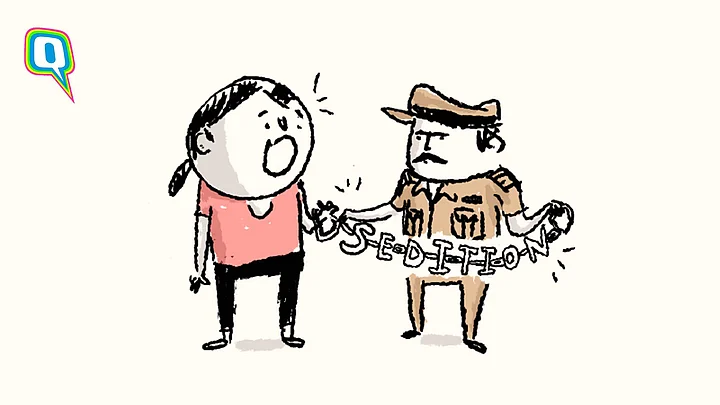On May 31, the Supreme Court reignited the debate on the validity of India’s sedition law. While hearing a plea moved by two Telugu TV channels seeking interim protection in a sedition case filed against them, the apex court said, “it’s time we define limits of sedition.”
We are of the view that the ambit and parameters of Sections 124A, 153A and 505 of the Indian Penal Code would require interpretation, particularly in the context of the right of the electronic and print media to communicate news, information and the rights, even of those that may be critical of the prevailing regime in any part of the nation.Supreme Court
What was introduced by the Colonial regime to coerce Indians to show “affection” towards the government, has in post-Independence India, become a weapon to stifle dissent and throttle free speech that seeks accountability in governance.
The trajectory of the sedition law, the patterns of who is targeted and how they are made to suffer by a discriminatory penal system, show that mere “interpretation” or further “defining limits” of the provision is not a solution. The process of decolonisation can only be furthered by completely removing sedition from the statute books.
What Is Sedition
Section 124A of the Indian Penal Code defines sedition as “any action - whether by words, signs or visible representation - which “brings or attempts to bring into hatred or contempt, or excites or attempts to excite disaffection towards the Government established by law in India.”
During the British Raj, this provision was invoked against Bal Gangadhar Tilak and Mahatama Gandhi, among many others. Commenting on his sedition trial, Gandhi had said, “Section 124-A, under which I am happily charged, is perhaps the prince among the political sections of the IPC designed to suppress the liberty of the citizen.”
In Kedar Nath v. the State of Bihar (1962), the constitution bench of the Supreme Court upheld the constitutional validity of Section 124A of the IPC. However, the court said that the offence of sedition would only be made out if the disputed speech amounts to “inciting violence against the government with the intention to create public disorder”. Therefore, a higher threshold of intentional inciting of violence was envisaged by the court.
In order to ensure that the police doesn’t abuse its powers by mechanically invoking sedition against dissenters, the Supreme Court in Common Cause v. Union of India (2016) directed the police officers to strictly adhere to threshold set in the Kedar Nath judgment.
Flagrant and Repeated Abuse of the Sedition Law
The higher threshold set by the Supreme Court in Kedar Nath judgment has not deterred governments from misusing the sedition law for political advantage or to stifle dissent.
Official data published by the National Crime Records Bureau clearly shows that a majority of sedition cases do not even end up in convictions. However, the alarming rise in arrests and delay in filing chargesheets, despite the falling rate of conviction, exposes the intention of the government to use the law to punish the idea and not the crime.
In 2018, the Law Commission of India in its report on the sedition law had clearly stated that for merely expressing a thought that is not in consonance with the policy of the Government of the day, a person should not be charged under sedition.
While it is essential to protect national integrity, it should not be misused as a tool to curb free speech. Dissent and criticism are essential ingredients of a robust public debate on policy issues as part of a vibrant democracy. Therefore, every restriction on free speech and expression must be carefully scrutinised to avoid unwarranted restrictions.Law Commission of India
Abuse of Sedition Law Abuse has Risen since 2014
Article 14, a media portal, published a database on February 02 tracking sedition cases in India.
Article 14’s sedition database reveals that there was a 28 per cent rise in sedition cases in the last decade (2010-20). These cases were mostly filed against protestors, journalists, academics, and politicians, clearly violating the guidelines of the Supreme Court in various judgments.
The database further shows that 96 per cent of sedition cases filed against 405 Indians for criticising politicians and governments over the last decade had been registered after 2014, with 149 accused of making “critical” and/or “derogatory” remarks against Modi, and 144 against Uttar Pradesh (UP) chief minister Yogi Adityanath.
Abolish Sedition, The Only Option
The data as well as the patterns of the implementation of sedition law in India shows that merely “restricting the application” of Section 124A would not suffice. The Supreme Court needs to take into account the adverse impact of penalising dissent on the fundamental right to freedom of speech and expression.
Siddharth Narrain, a lawyer and PhD scholar at the University of New South Wales, questions the need for a Colonial legacy which, in its logic, believes that people are bound to feel affection for the state. He argues that a provision that coerces people to not show any enmity, contempt, hatred or hostility towards the government established by law, has no place in a modern democratic state like India.
Narrain believes that the government files sedition charges against persons they want to target.
The chilling effect of these laws threatens to undermine, and gradually destroy, the legitimate and constitutionally protected right to protest against, dissent or criticise the government.Siddharth Narrain
On May 03, the Supreme Court issued a notice in a plea moved by two journalists from Madhya Pradesh and Chhattisgarh, challenging the constitutional validity of Section 124A of the Indian Penal Code.
The petitioners have argued that the vagueness of Section 124A exerts an unacceptable chilling effect on the democratic freedoms of individuals who cannot enjoy their legitimate democratic rights in fear of life imprisonment.
They have further submitted that the sedition law has been repealed in comparative post-Colonial jurisdictions around the world.
The Supreme Court will next hear the matter on July 12.
